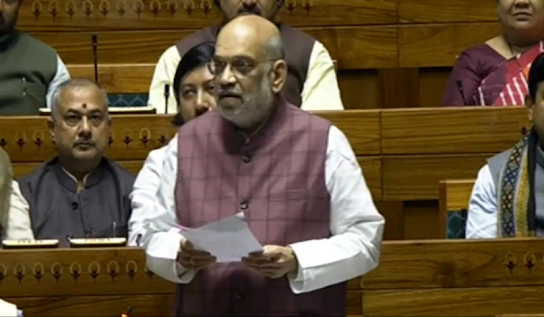A recent fiery session in the Lok Sabha, Union Home Minister Amit Shah dropped a political bombshell that echoed through the chambers. During a debate on the Jammu and Kashmir Reservation (Amendment) Bill, 2023, and the Jammu and Kashmir Reorganisation (Amendment) Bill, 2023, Shah declared that the Delimitation Commission had earmarked 24 seats for Pakistan occupied Kashmir (PoK).
Picture this: a political chessboard being rearranged, with 24 reserved seats acting as strategic pawns in a complex game. The audience, both within the parliament and beyond, was left buzzing with the implications of this surprising move.
Shah went on to provide a glimpse into the broader canvas of changes. Jammu saw an increase from 37 to 43 seats, and Kashmir, not to be outdone, went from 46 to 47. However, the real jaw-dropper was the assertion that the 24 reserved seats for PoK were a clear proclamation of ownership— "PoK is ours."
The political drama didn't stop there. Amit Shah skillfully navigated through the historical maze, targeting none other than India's first Prime Minister, Pandit Jawaharlal Nehru. Blaming Nehru for the predicament of PoK, Shah claimed that had it not been for Nehru's blunders, that part would have rightfully belonged to Kashmir.
In a moment that could be described as a theatrical crescendo, Shah quoted Nehru admitting the handling of the PoK issue was "his mistake." The Home Minister, however, was quick to dismiss it as a mere "blunder" that led to a substantial loss of Indian territory.
As the political rhetoric reached its peak, several Congress MPs staged a dramatic walkout, seemingly unable to weather the storm of accusations. Amit Shah, unfazed, commented wryly that even if he had used the term 'Himalayan' to describe Nehru's blunders, it would have led to resignations.
Shah continued his verbal onslaught by attributing two major blunders to Nehru—declaring a ceasefire and taking the Kashmir issue to the United Nations. According to him, a delayed ceasefire could have secured PoK as part of India, and involving the UN was a second misstep that plagued the region.
Not content with that, Shah directed blame towards the Congress for the exodus of Kashmiri Pandits in the early 1990s. He argued that without the influence of vote bank politics, the tragic displacement could have been averted.
The parliamentary session became a stage for Shah's political theater, where the past and present collided, leaving in their wake a reshaped political landscape. Amit Shah's bold moves and unapologetic rhetoric left everyone pondering the consequences and wondering what other surprises the political arena might hold in the days to come.






0 Comments